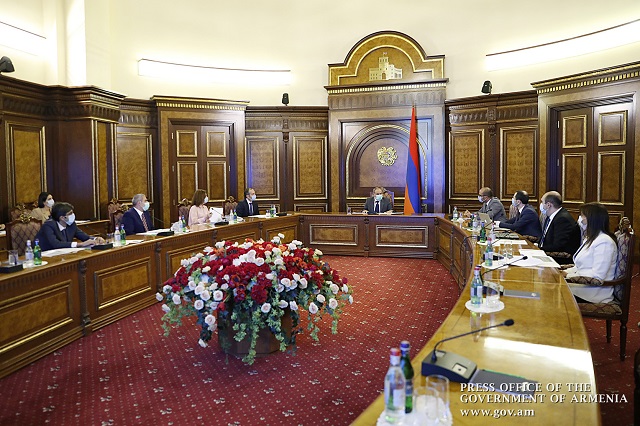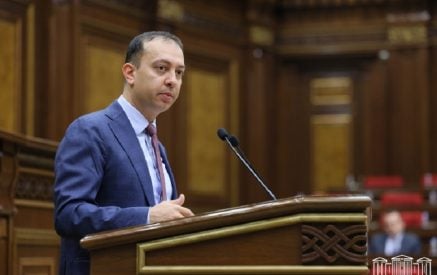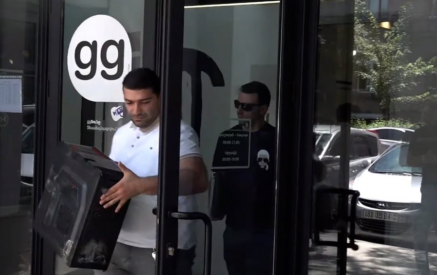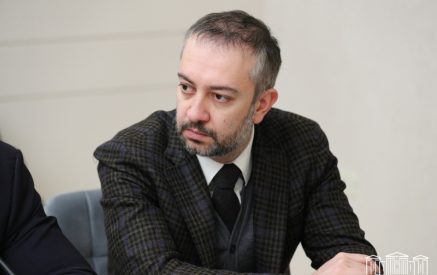The Government continues discussing public agencies’ performance reports for 2019-2020. For the first time, annual performance reports were submitted by government-affiliated inspection authorities. Today, the Health and Labor, Education, and Market Control inspectorates reported on the work done in 2019 and during this year’s first 8 months.
Arthur Asoyan, Head of the Office for Coordination of Inspection Bodies’ Activities, presented the programs implemented in the inspection sphere. He advised that 6 inspection bodies were formed in 2018 after optimizing the government-affiliated 18 inspectorates. Owing to clear separation of functions, the newly formed entities are independent of the policy-making authority, and there is no conflict of interest as it used to be before the optimization.
A significant achievement was the introduction of a system of risk-based inspections in all areas. Planned inspections are carried out after assessing the risks available in economic entities, and not on a random basis.
Mr. Asoyan reported some 81,000 inspections carried out in 2020 as part of the anti-epidemic campaign. The activities of 5,300 economic entities were suspended following the inspections.
Read also
Work is underway to improve the efficiency assessment standards, the applicable legislation, as well as to develop effective public oversight mechanisms based on the use of state-of-the-art technologies.
Head of the Health and Labor Inspectorate Hakob Avagyan noted that:
– computers and other equipment was purchased and the working conditions were improved in 2019;
– The Meghri Medical and Sanitary Control checkpoint was relocated in a new site, which offers better working conditions. It has a special section to host people with symptoms typical of infectious diseases. The construction of a checkpoint at Zvartnots Airport is underway.
– As a result of legislative improvements, from now on all complaints about violation of workers’ rights during the emergency situation will be considered by the Authority; full control is due to start as early as in 2021. An electronic system for online presentation of complaints will be launched in the near future.
– 1674 administrative proceedings were launched in 2019, 1466 more than in 2018. 548 out of 1674 cases related to compliance with sanitary rules and regulations for public toilets at gas and petrol stations. In 2020, 23144 inspections were conducted during the state of emergency, and 710 administrative cases were initiated.
– A hotline and a new website referred to as https://hlib.am/ were launched and large-scale awareness raising activities were carried out in the period under review.
– The central and regional offices will have new buildings, which will save the funds used on rent.
The Prime Minister asked whether the work done as a result of the initiation of cases contributed to a qualitative change in this direction. Mr. Asoyan and Mr. Avagyan reported that their authorities are cooperating with the Ministry of Territorial Administration and Infrastructure, an inventory of public toilets is being implemented and a package of proposals has been developed and disseminated.
Head of the Education Inspectorate Alexander Shaghafyan noted that the checkups carried out in in 2019 revealed positive dynamics in terms of the results of written works submitted by students, the average risk unit as a result of checkups in the sphere of general education and the number of applications. There are some problems associated with the staffing of preschool, general education and secondary vocational schools.
1,086 inspections were conducted in kindergartens, as a result of which the operations of 15 kindergartens were suspended for several days. An electronic survey was conducted to determine the involvement of distance education: the survey of questionnaires completed by 400 schools and 45 primary and secondary vocational educational institutions showed 80 percent participation in distance learning activities.
A draft law “On State Control in Education” was developed and submitted for discussion. The Bill is meant to contribute to more effective state control over the content of education.
Touching on the quality of education, the Premier wanted to know what is being done in this direction. Mr. Shaghafyan said the process is carried out through written reports drafted as part of the proposed conceptual reforms. Given the limited capacity and resources, the Education Inspectorate is considering automating the process through innovative technologies.
Head of the Market Surveillance Inspection Authority Armen Kotolyan presented the results of inspections of non-food products, ensuring the unity of measurements and products made of precious metals. The applicable legislation was amended; the number of inspections was 40% more than planned in the period under review: a total of 743 inspections were conducted, and 503 violations were registered. In particular:
– The sales are now carried out in kilograms at gas filling compressor stations. No cases of under-refueling were found during the inspections carried out since May 2019.
– The requirement to inform business entities 3 working days prior to checking compliance with metrological standards has been removed. As a result, the number of detections of malfunctions at filling stations has increased, and consequently, the number of complaints about under-fueling has decreased.
Mr. Kotolyan next touched upon the risks in the field of motor gasoline and diesel fuel, liquefied hydrocarbons, toys, goods for children and teenagers. He noted that the Market Surveillance Authority used to check only the availability of a relevant certificate, but as a result of improved legislation, the compliance of the product with the standards will henceforth be assessed. A package of proposals for tougher sanctions has been put into circulation.
The Prime Minister was provided detailed information on the possibility of conducting laboratory tests within the inspectorate. Issues related to the improvement of technical equipment were discussed.
Summing up the meeting, Chief of Staff of the Office of the Prime Minister Eduard Aghajanyan noted that a lot has been done since 2018, especially in terms of streamlining the legal framework applicable to inspections. Close cooperation has been established with the office coordinating the activities of different inspection authorities.
INFORMATION AND PUBLIC RELATIONS DEPARTMENT OF THE OFFICE OF THE PRIME-MINISTER OF THE REPUBLIC OF ARMENIA




























































